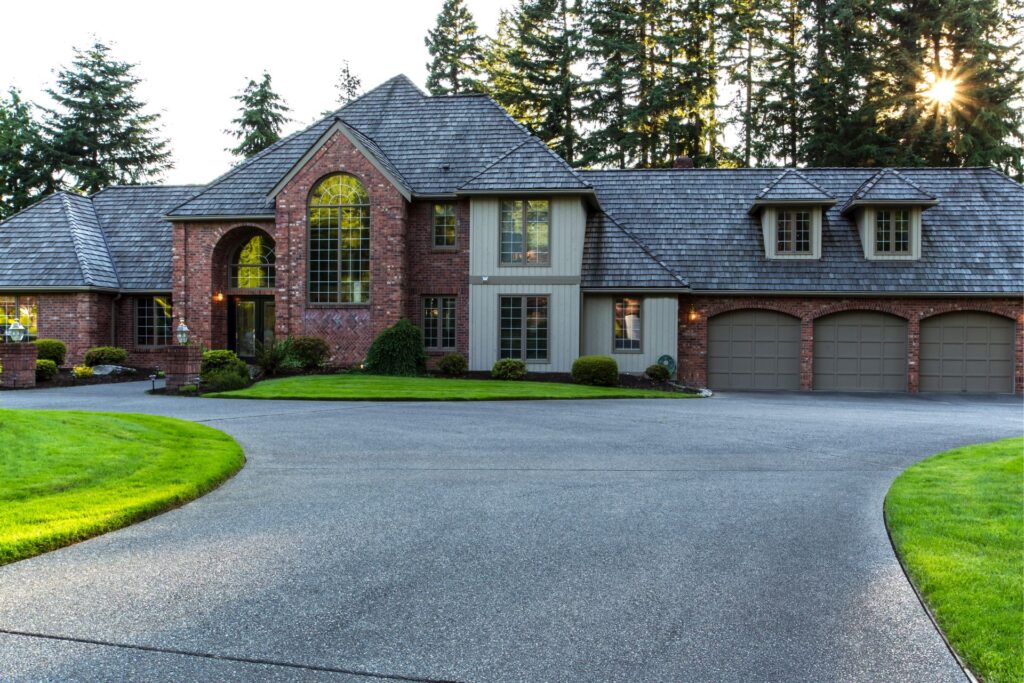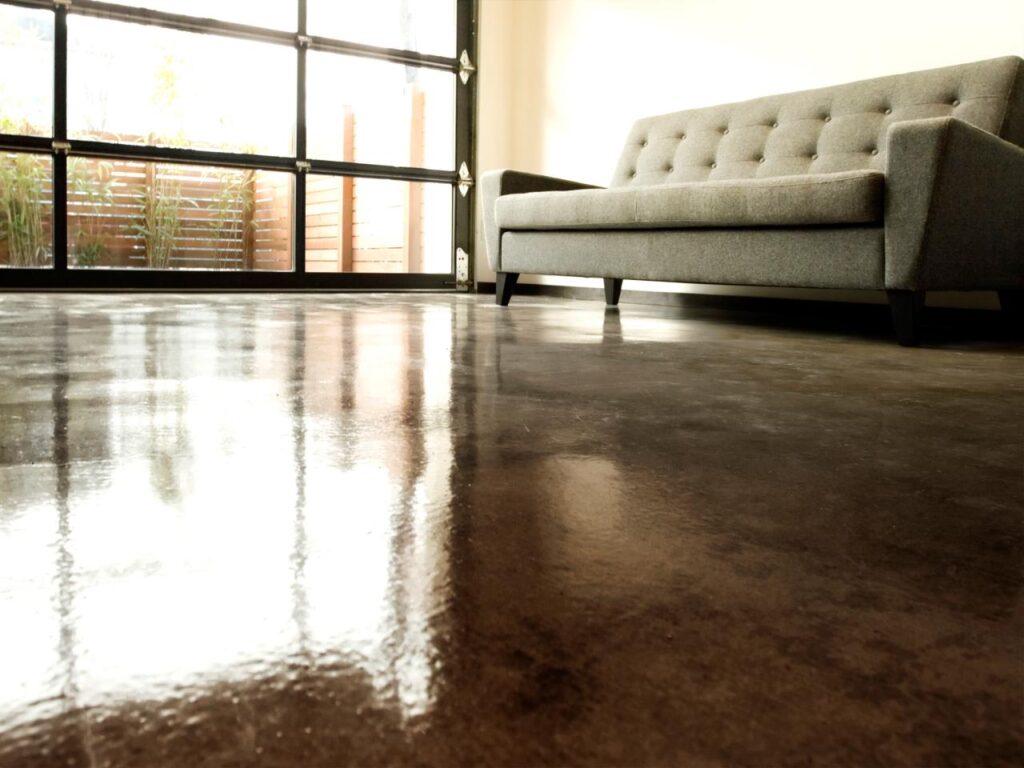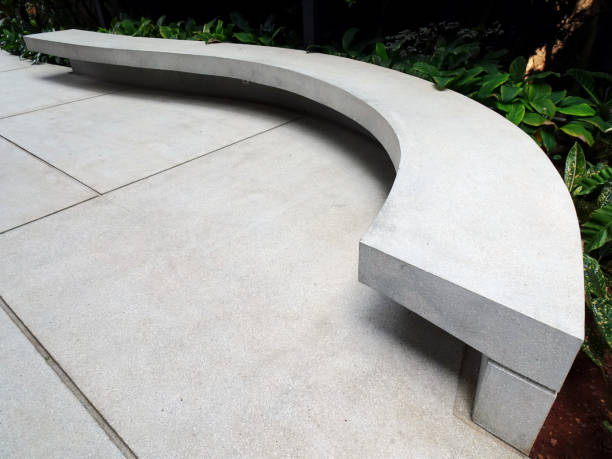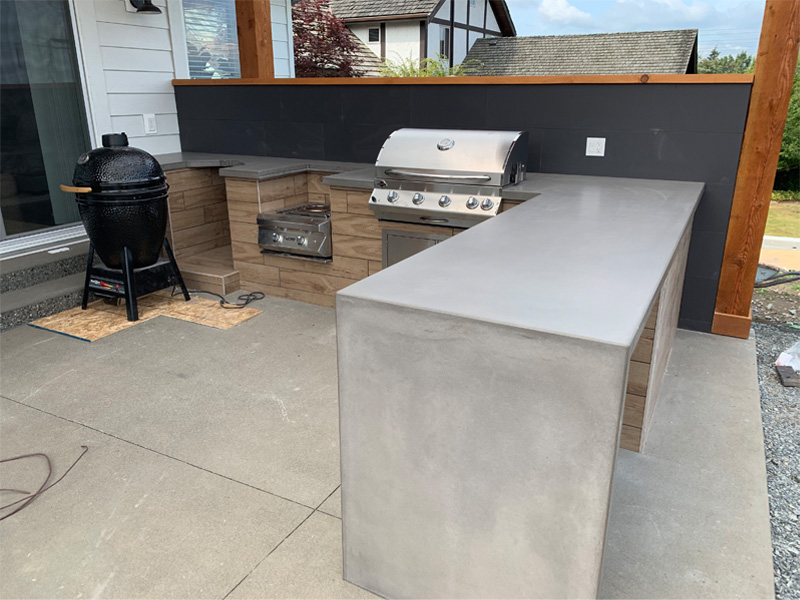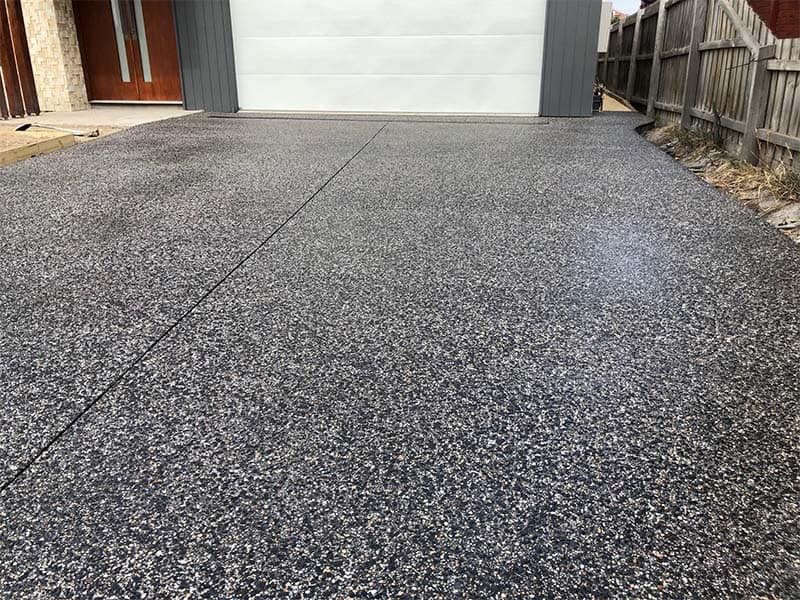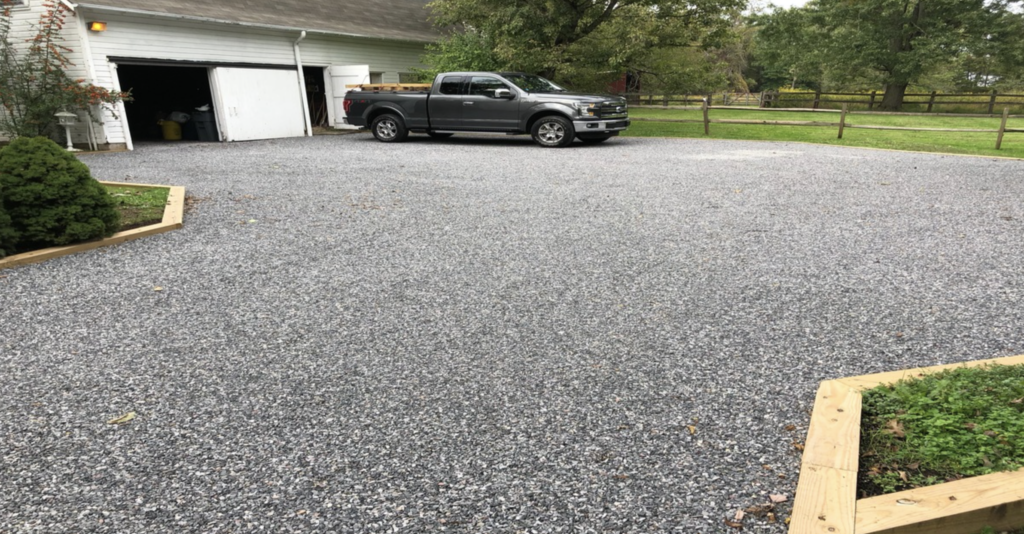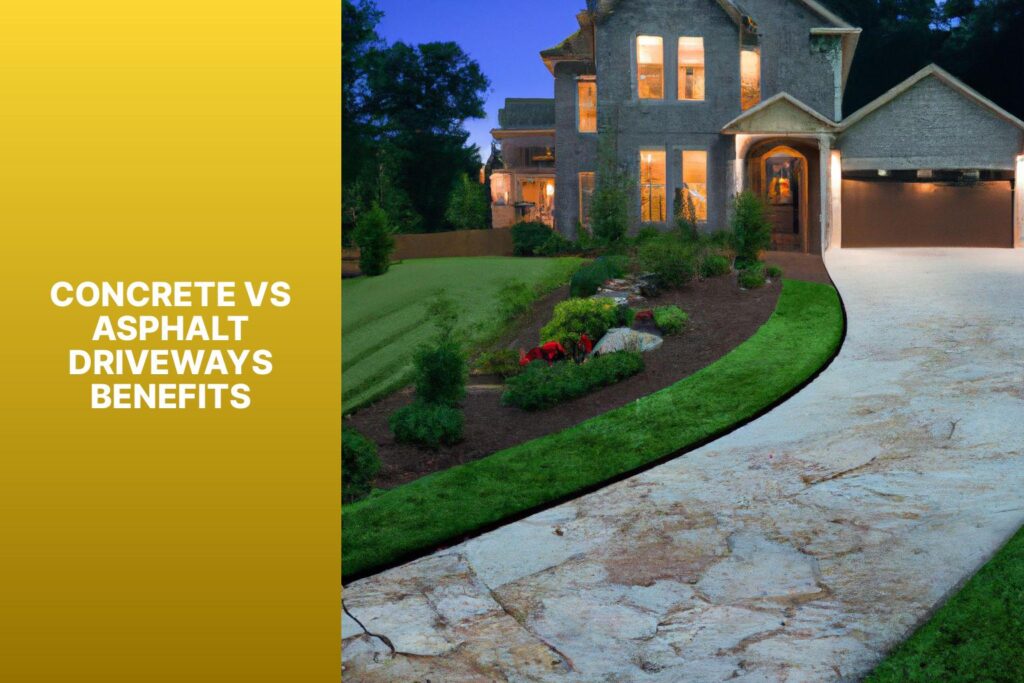Welcome to our comprehensive guide on the benefits of choosing a concrete driveway for your home! When it comes to enhancing your property’s curb appeal and functionality, the driveway plays a crucial role. Whether you’re building a new home or looking to upgrade your existing driveway, selecting the right material is key to long-lasting satisfaction and minimal maintenance. Concrete driveways have become a popular choice among homeowners due to their durability, versatility, and cost-effectiveness. In this blog, we’ll explore the many advantages of concrete driveways, from their impressive longevity to their ability to boost your home’s value and aesthetic appeal, helping you make an informed decision that will stand the test of time.
Concrete driveways offer numerous advantages, including exceptional durability, low maintenance requirements, and a long lifespan of up to 30 years or more. They are also highly versatile, allowing for various finishes, colors, and patterns to enhance curb appeal. Additionally, concrete driveways are cost-effective over time, environmentally friendly, and provide a safe, non-slip surface, making them an ideal choice for homeowners looking to improve their property’s value and functionality.
- What is a Concrete Driveway?
- Advantages Of Concrete Driveways (Main Body)
- Comparing Concrete Driveways To Other Materials
- FAQs: About What Are The Advantages Of Concrete Driveways?
- How long does a concrete driveway typically last?
- What maintenance is required for a concrete driveway?
- Are concrete driveways environmentally friendly?
- Can I install a concrete driveway myself?
- How does a concrete driveway compare to an asphalt driveway?
- What are the design options available for concrete driveways?
- Do concrete driveways crack easily?
- How do I clean and maintain a concrete driveway?
- Can concrete driveways be repaired if damaged?
- How does weather affect a concrete driveway?
- Conclusion
What is a Concrete Driveway?
A concrete driveway is a popular choice for homeowners and businesses alike, known for its strength, durability, and clean, modern look. It is constructed using a mixture of cement, water, and aggregates such as sand, gravel, or crushed stone. This combination is poured and shaped into a solid surface that can withstand the wear and tear of daily use. Concrete driveways have become a standard feature in many neighborhoods, offering a practical and visually appealing solution for vehicle parking and access.
Definition of a Concrete Driveway
At its core, a concrete driveway is a paved surface designed to handle the weight and movement of vehicles. The primary materials used in its construction—cement, water, and aggregates—are mixed to form a paste that binds the components together. Once the mixture is prepared, it is poured onto a prepared surface and leveled to create a smooth, even finish. As the concrete sets and hardens, it forms a durable surface that is capable of withstanding significant pressure and environmental conditions. The result is a sturdy and reliable driveway that can last for decades with proper maintenance.
Concrete driveways are renowned for their versatility. They can be customized with various finishes, colors, and patterns to match the aesthetic preferences of the homeowner or business. This makes them an ideal choice for those looking to enhance the curb appeal of their property while also investing in a long-lasting surface.
Common Uses of Concrete Driveways
Concrete driveways are commonly found in both residential and commercial settings due to their durability, low maintenance requirements, and ability to be tailored to fit different needs and preferences.
Residential Applications: In residential areas, concrete driveways are often the go-to choice for homeowners. They provide a sturdy and reliable surface for parking vehicles, from family cars to larger trucks and recreational vehicles. The appeal of a concrete driveway extends beyond its functionality. It adds a clean, polished look to the front of a home, enhancing its overall curb appeal. Homeowners appreciate that concrete driveways require minimal upkeep compared to other materials like gravel or asphalt. A properly installed concrete driveway can last anywhere from 25 to 50 years or more, depending on the climate and how well it is maintained.
Commercial Applications: In commercial environments, concrete driveways are frequently used in parking lots, loading docks, and areas that experience heavy traffic. Businesses often choose concrete for its durability and capacity to support the weight of multiple vehicles, including delivery trucks and other heavy equipment. Additionally, concrete’s ability to be molded into large, seamless sections makes it ideal for expansive parking areas, reducing the likelihood of cracks and surface damage.
In both settings, concrete driveways are valued for their resistance to weather conditions. They perform well in various climates, from hot, sunny areas where they reflect heat to cold regions where their solid structure resists cracking under freeze-thaw cycles. This versatility makes concrete an excellent choice for driveways across different geographic locations.
Why Choose a Concrete Driveway?
Opting for a concrete driveway comes with several benefits beyond just durability and aesthetics. One of the main reasons people choose concrete over other materials is its long lifespan. Unlike asphalt, which may require resealing every few years, or gravel, which can erode or become uneven, concrete driveways remain stable and attractive with minimal maintenance. A simple routine of sealing the surface every few years and promptly addressing any minor cracks or stains can keep a concrete driveway looking new for decades.
Additionally, concrete driveways offer a level of safety. The surface is not prone to shifting or settling over time, reducing the risk of tripping hazards. This is particularly important in residential areas where children might play or elderly residents may be walking.
Another advantage is that concrete is environmentally friendly. Since concrete is made from abundant natural resources—limestone, clay, and water—it has a lower carbon footprint compared to some other paving materials. Moreover, light-colored concrete can reflect sunlight, reducing heat absorption and keeping the surrounding environment cooler.
In conclusion, a concrete driveway is more than just a practical surface for parking vehicles; it’s a long-term investment in the functionality and aesthetics of a property. Whether in a residential or commercial setting, concrete driveways offer a blend of durability, low maintenance, and customization options that make them a preferred choice for many. Their ability to withstand various weather conditions, coupled with their environmental benefits, further underscores why concrete driveways continue to be a popular option for property owners looking for a reliable and attractive paving solution.
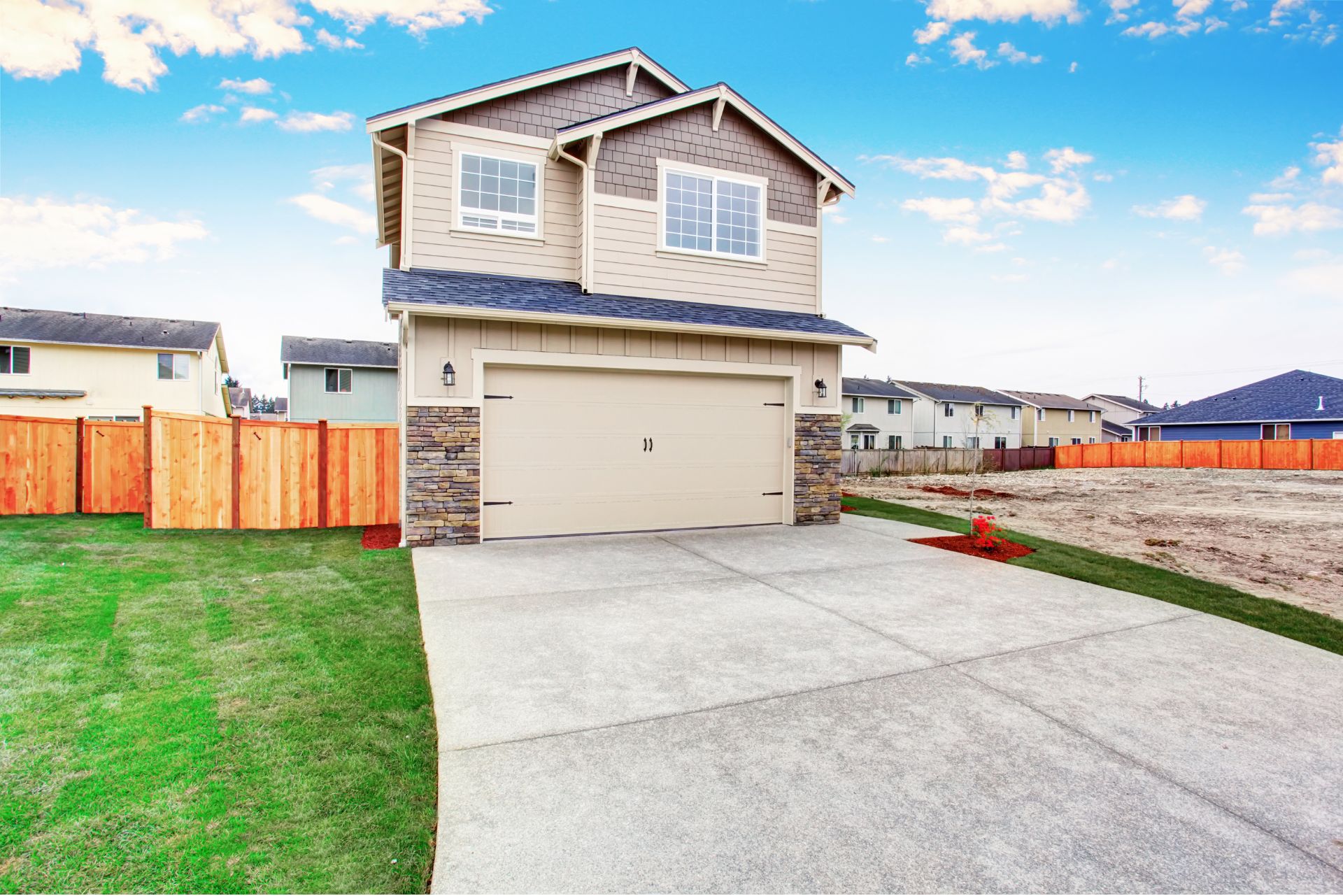
Advantages Of Concrete Driveways (Main Body)
Choosing the right material for your driveway is an important decision, as it impacts not only the appearance of your home but also its functionality and maintenance requirements. Concrete driveways have gained popularity among homeowners due to their numerous advantages. Let’s explore the key benefits of opting for a concrete driveway and why it might be the best choice for your home.
Durability and Longevity
One of the most significant advantages of concrete driveways is their durability and longevity. Concrete is a strong and robust material that can withstand heavy loads and resist wear and tear. This makes it an ideal choice for driveways that see frequent use, including those that need to accommodate heavy vehicles such as trucks or RVs. Unlike other materials that may crack or deteriorate under stress, concrete maintains its integrity, ensuring your driveway remains functional and visually appealing for years.
- Durability: Concrete’s strength lies in its ability to endure harsh weather conditions and resist daily wear and tear. For instance, concrete driveways are less likely to develop potholes or cracks compared to asphalt driveways. This resistance to damage is particularly beneficial in regions with fluctuating temperatures, where freeze-thaw cycles can wreak havoc on less durable materials.
- Longevity: A concrete driveway, when properly installed and maintained, can last up to 30 years or more. This longevity outperforms many other materials like asphalt or gravel, which may require more frequent replacements or repairs. By choosing concrete, you invest in a long-term solution that will serve your property well for decades, potentially saving money on future repairs or replacements.
Low Maintenance
Another notable advantage of concrete driveways is their low maintenance requirements. Homeowners often find that concrete is easier to care for compared to other driveway materials, which translates to less time and money spent on upkeep.
- Easy to Clean: One of the primary benefits of a concrete driveway is how easy it is to clean. Unlike gravel driveways that require regular raking to keep the surface even, or paver driveways that may need constant weeding between pavers, concrete driveways require minimal effort to maintain. A simple hose-down or occasional pressure wash is typically sufficient to keep a concrete driveway looking clean and fresh.
- Resistant to Stains and Damage: Concrete is also highly resistant to stains and surface damage. Oil spills and other potential contaminants can be easily cleaned without leaving permanent marks, a common issue with asphalt driveways. Moreover, concrete’s solid surface prevents the formation of potholes, which means fewer repairs and less hassle over time.
Aesthetic Versatility
Concrete driveways offer unparalleled aesthetic versatility, allowing homeowners to customize their driveways to suit their personal style and complement their home’s architecture.
- Customization Options: With a range of finishes, colors, and patterns available, concrete can be tailored to meet a wide variety of design preferences. For example, stamped concrete can mimic the appearance of brick, stone, or slate, providing a high-end look at a fraction of the cost. Colored concrete can also be used to match or contrast with the color scheme of your home, creating a cohesive and attractive exterior.
- Complementing Home Design: A well-designed concrete driveway not only enhances the appearance of your property but also boosts its curb appeal. The clean lines and smooth surface of a concrete driveway provide a modern and polished look that complements any home style, from traditional to contemporary. This aesthetic appeal can make a significant difference in the overall impression of your home, especially if you are considering selling in the future.
Cost-Effectiveness
When evaluating driveway materials, cost is always a critical factor. Concrete driveways, while sometimes more expensive initially than alternatives like asphalt, offer excellent long-term value.
- Initial Cost vs. Longevity: The initial investment for a concrete driveway may be higher than other materials, but its durability and minimal maintenance requirements can lead to significant savings over time. Unlike asphalt, which may need to be resurfaced or replaced every 10 to 15 years, a concrete driveway can last for decades with little more than occasional sealing.
- Return on Investment: Investing in a concrete driveway can also increase your property value. A durable, attractive driveway is a sought-after feature for potential buyers, providing a great return on investment. This can be especially important in competitive real estate markets, where every detail counts in making a home more appealing to prospective buyers.
Environmental Benefits
Concrete driveways are also environmentally friendly, offering several ecological advantages that make them a sustainable choice for homeowners.
- Sustainability: With advancements in technology, the production of concrete has become more sustainable. Modern techniques have reduced the carbon footprint associated with concrete manufacturing, making it a more eco-friendly option compared to traditional asphalt.
- Reflectivity: Additionally, the light color of concrete driveways helps reflect sunlight rather than absorb it, which reduces the urban heat island effect. This reflectivity can help keep your driveway—and by extension, your home—cooler during the hot summer months, reducing the need for air conditioning and lowering energy costs.
Safety Features
Safety is another important consideration when choosing a driveway material. Concrete driveways offer several safety features that make them a practical choice for families and properties of all types.
- Non-Slip Surface: Concrete can be textured or treated to create a non-slip surface, providing added safety for both foot traffic and vehicles, especially in wet or icy conditions. This non-slip feature can help prevent accidents, making your driveway safer for family members and visitors alike.
- Visibility: The light color of concrete also improves visibility at night, which can enhance safety. A brighter driveway surface is easier to see in low-light conditions, helping drivers and pedestrians navigate safely.
Concrete driveways offer numerous advantages, from their durability and low maintenance to their aesthetic versatility and environmental benefits. By choosing concrete, homeowners can enjoy a long-lasting, cost-effective, and attractive driveway that enhances both the functionality and curb appeal of their property. Whether you’re building a new home or replacing an old driveway, consider the many benefits of concrete as a reliable and stylish solution.
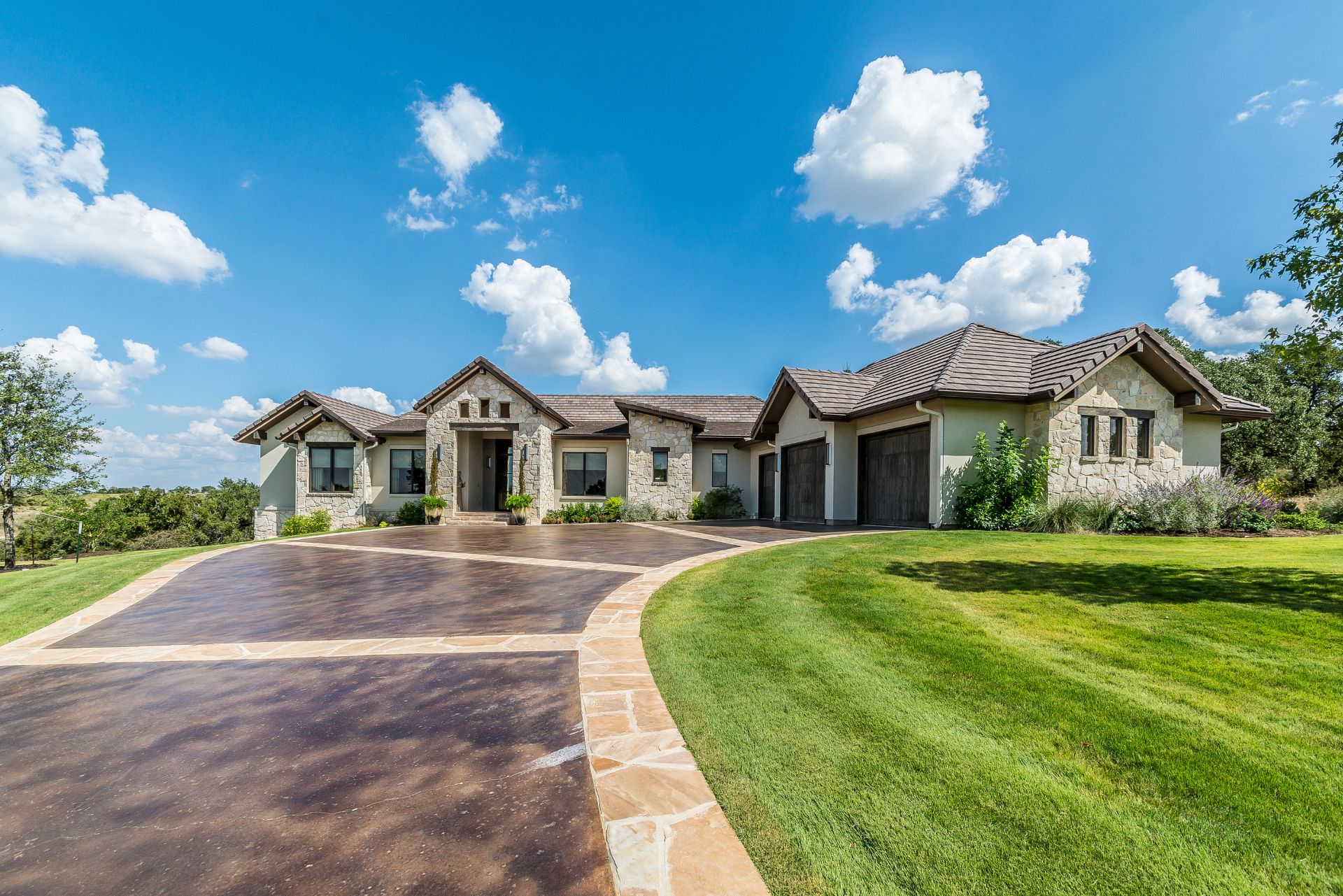
Comparing Concrete Driveways To Other Materials
When it comes to choosing a driveway material, homeowners often find themselves weighing several options: concrete, asphalt, gravel, and pavers. Each material has its own set of advantages and disadvantages in terms of durability, cost, maintenance, and aesthetics. In this section, we’ll explore how concrete driveways stack up against other popular materials, helping you make an informed decision for your home.
Concrete vs. Asphalt Driveways
Concrete and asphalt are two of the most commonly used materials for driveways, but they differ significantly in terms of durability, maintenance requirements, and cost.
- Durability: Concrete driveways are known for their long-lasting durability. They can last anywhere from 30 to 40 years with proper maintenance, far surpassing the lifespan of asphalt driveways, which typically last about 20 years. This is due to the composition of concrete, which is resistant to weathering and can withstand heavier loads without significant wear and tear.
- Maintenance: While asphalt driveways may be cheaper to install initially, they require more frequent maintenance. Asphalt is more susceptible to cracking and potholes due to temperature fluctuations and heavy use. This means homeowners often need to reseal their asphalt driveways every few years to protect them from damage. In contrast, concrete driveways require less frequent maintenance and are more resistant to weather changes, making them a cost-effective choice in the long run.
- Cost: Initially, asphalt driveways are more affordable than concrete. However, the ongoing maintenance costs associated with asphalt can add up over time. Concrete, while more expensive upfront, tends to have lower long-term maintenance costs, making it a more economical option over the driveway’s lifetime. For homeowners looking for a balance between upfront cost and long-term value, concrete often emerges as the preferred choice.
Concrete vs. Gravel Driveways
Gravel driveways are another popular choice, especially for rural areas or properties with long driveways. They are typically chosen for their affordability and ease of installation, but how do they compare to concrete?
- Appearance: Concrete driveways offer a clean, sleek appearance that can complement a wide range of architectural styles. Gravel driveways, on the other hand, have a more rustic look, which might be ideal for country settings or older homes but may not suit more modern properties.
- Maintenance: Gravel driveways require frequent maintenance. The stones can shift, creating uneven surfaces, and weeds can grow through the gravel, requiring regular weeding or herbicide application. Moreover, gravel can scatter, requiring periodic replenishment. In contrast, concrete driveways provide a stable, solid surface that requires minimal upkeep—usually just occasional cleaning and sealing to maintain their appearance.
- Climate Suitability: When considering climate, gravel driveways may not be the best option for all regions. In snowy climates, for example, snow removal can be challenging with a gravel driveway. Snowplows can displace the gravel, leading to additional maintenance in spring. Concrete driveways, however, offer a smooth, flat surface that is easy to clear of snow and ice, making them ideal for colder climates.
Concrete vs. Pavers
Pavers are another alternative for driveways, often chosen for their aesthetic appeal and design flexibility. However, they come with their own set of pros and cons compared to concrete.
- Aesthetic Flexibility: Pavers provide a wide range of design possibilities, allowing homeowners to create unique patterns and colors that can enhance the curb appeal of a home. They offer a more customized appearance than a standard concrete driveway, which is generally limited to a few finishes and colors unless it is stamped or stained. However, stamped or stained concrete can mimic the appearance of pavers while retaining the durability of a solid slab.
- Cost: Pavers can be significantly more expensive than concrete, both in terms of materials and installation. Each paver needs to be set individually, which increases labor costs. Additionally, the material cost of high-quality pavers can be quite high. In contrast, a concrete driveway, while still a significant investment, is generally less costly than a driveway made of pavers.
- Durability and Maintenance: Over time, pavers can become uneven due to settling or shifting, requiring regular maintenance to keep the surface level and safe. Weeds can also grow between the pavers, necessitating periodic weeding or herbicide use. Concrete driveways, on the other hand, provide a continuous surface that is more resistant to settling and weed growth, requiring less maintenance over time.
In summary, concrete driveways offer a durable, low-maintenance option that balances upfront costs with long-term value. While alternatives like asphalt, gravel, and pavers each have their unique benefits, concrete stands out for its longevity, minimal upkeep, and versatility in different climates and settings. Whether you prioritize cost, durability, or aesthetics, concrete driveways provide a reliable and appealing choice for homeowners looking to invest in a long-lasting and attractive solution for their driveways.
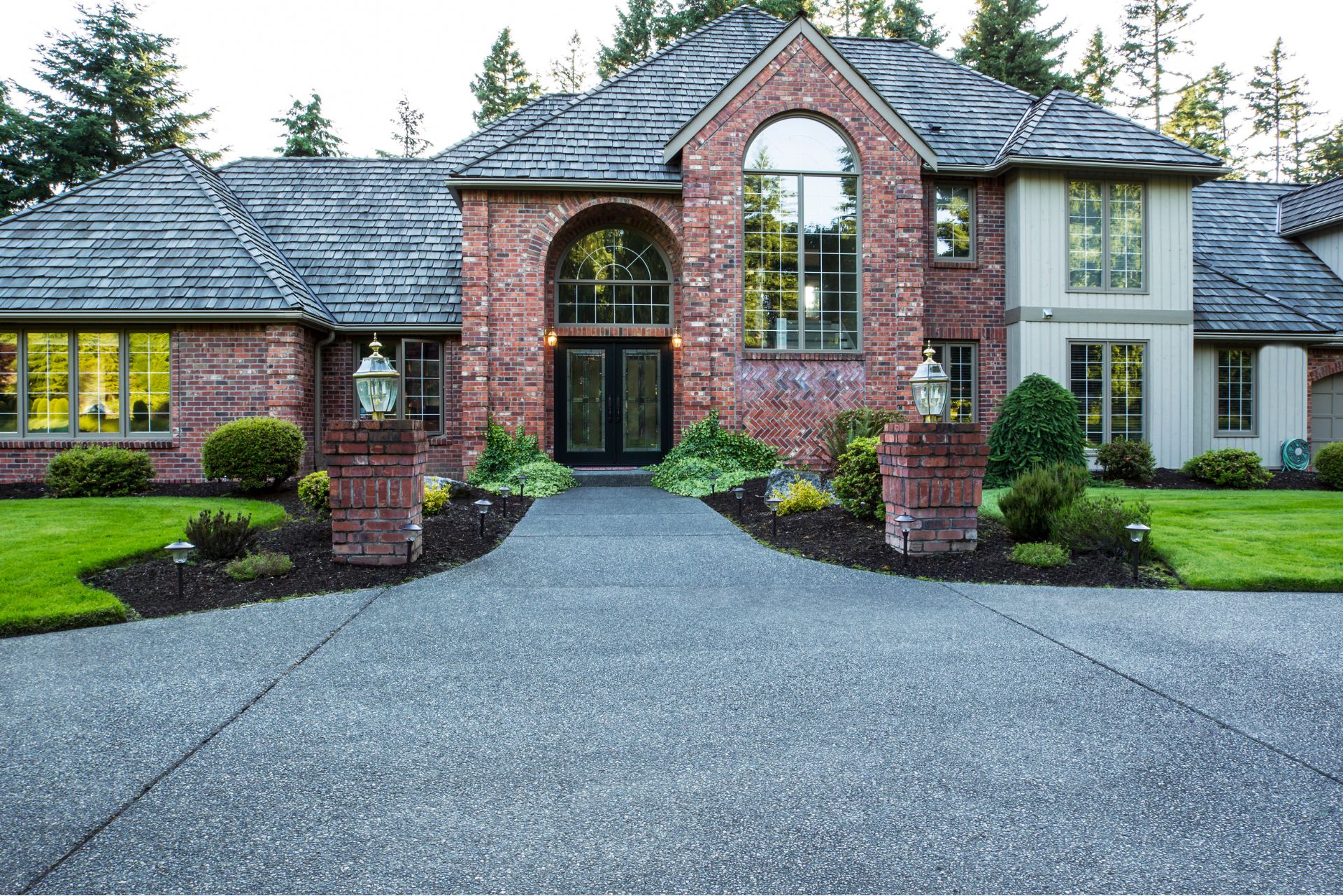
FAQs: About What Are The Advantages Of Concrete Driveways?
How long does a concrete driveway typically last?
A well-maintained concrete driveway can last anywhere from 25 to 30 years or more. The longevity depends on factors such as the quality of the installation, the type of concrete used, climate conditions, and how well the driveway is maintained over time. Regular sealing and prompt repairs can help extend the lifespan of a concrete driveway.
What maintenance is required for a concrete driveway?
Concrete driveways require minimal maintenance compared to other materials. Basic upkeep involves regular cleaning to remove dirt and debris, sealing the surface every 2-3 years to protect against stains and weather damage, and addressing any cracks or chips promptly to prevent them from worsening.
Are concrete driveways environmentally friendly?
Yes, concrete driveways can be an environmentally friendly choice. Concrete is made from abundant natural materials like limestone, and advancements in concrete production have reduced its carbon footprint. Additionally, concrete’s light color reflects sunlight, reducing heat absorption and mitigating the urban heat island effect.
Can I install a concrete driveway myself?
While it is possible for a skilled DIYer to install a concrete driveway, it is generally recommended to hire a professional. The process involves precise preparation, mixing, pouring, and finishing to ensure a durable and level surface. Mistakes during installation can lead to costly repairs or reduced lifespan.
How does a concrete driveway compare to an asphalt driveway?
Concrete driveways are generally more durable and have a longer lifespan than asphalt driveways. While asphalt is initially cheaper to install, it requires more frequent maintenance and has a shorter lifespan, making concrete more cost-effective in the long run. Concrete also offers more design options in terms of finishes, colors, and patterns.
What are the design options available for concrete driveways?
Concrete driveways offer a wide range of design possibilities. They can be stamped, stained, or colored to mimic the look of more expensive materials like brick, stone, or tile. Textured finishes can also be applied to enhance slip resistance and add visual interest.
Do concrete driveways crack easily?
Concrete driveways can develop cracks over time due to factors like freeze-thaw cycles, heavy loads, or improper installation. However, using high-quality materials, proper installation techniques, and regular maintenance can minimize the risk of cracking. Expansion joints can also be included to allow for natural movement and prevent large cracks.
How do I clean and maintain a concrete driveway?
Cleaning a concrete driveway is simple and can be done with a garden hose, broom, or pressure washer to remove dirt and debris. For stains, a mild detergent or a concrete cleaner can be used. It’s also advisable to seal the driveway every few years to protect against stains and weather damage.
Can concrete driveways be repaired if damaged?
Yes, minor cracks and surface damage in concrete driveways can be repaired with patching compounds or concrete fillers. For larger issues, such as deep cracks or significant structural damage, it might be necessary to consult a professional for more extensive repairs or resurfacing.
How does weather affect a concrete driveway?
Concrete driveways are generally resistant to weather conditions, but extreme weather can cause some wear. In colder climates, freeze-thaw cycles can lead to cracking if the driveway is not properly sealed. In warmer climates, concrete’s light color helps to reflect heat, making it cooler underfoot than darker materials like asphalt. Regular maintenance, such as sealing, can help mitigate weather-related damage.
Conclusion
In conclusion, concrete driveways offer a range of benefits that make them a smart choice for homeowners. From their remarkable durability and low maintenance requirements to their versatility in design and positive environmental impact, concrete driveways are a reliable and attractive option for enhancing any home’s curb appeal. If you’re thinking about upgrading your driveway, consider the lasting advantages of concrete and reach out to a local contractor to explore your options. Investing in a concrete driveway is more than just a practical decision—it’s a step toward improving the aesthetic appeal and overall value of your home, making it a worthwhile investment for the long term.
About the Author:
Mike Veail is a recognized digital marketing expert with over 6 years of experience in helping tradespeople and small businesses thrive online. A former quantity surveyor, Mike combines deep industry knowledge with hands-on expertise in SEO and Google Ads. His marketing strategies are tailored to the specific needs of the trades sector, helping businesses increase visibility and generate more leads through proven, ethical methods.
Mike has successfully partnered with numerous companies, establishing a track record of delivering measurable results. His work has been featured across various platforms that showcase his expertise in lead generation and online marketing for the trades sector.
Learn more about Mike's experience and services at https://theleadguy.online or follow him on social media:
